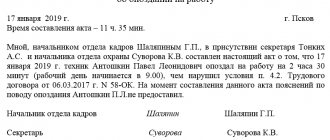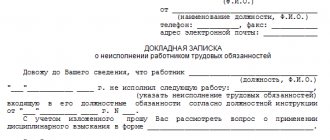For being late for work, you can reprimand the employee, reprimand him or even fire him. But dismissal is possible only if the employee already has an outstanding penalty (both for being late and for other offenses) or if he was more than four hours late. In order to avoid cancellation of penalties for being late, you first need to correctly record the lateness, for example, with a document. After this, you need to follow the standard procedure for bringing disciplinary action, in particular: request a written explanation from the employee, draw up an act if such explanations are not provided by the employee after two working days, select the type of penalty, issue an order to apply the penalty and familiarize the employee with it .
What is considered late for work?
Before considering issues of liability for lateness, it is advisable to clarify this concept and when it arises.
It is the employer's responsibility to establish a clear daily routine. It must comply with the requirements of the Labor Code of the Russian Federation in terms of the required hours for work, rest schedule, and the possibility of eating. The employee must be familiarized with such a document against signature at the time of signing the employment contract.
In this case, the following will be considered late:
- arriving at work later than the time designated as the beginning of the working day;
- returning to the workplace after the lunch break, after it ends;
- Unauthorized absence from the workplace during the working day.
It is important to note that when determining the degree of responsibility of an employee for failure to comply with the daily routine, the following nuances were taken into account:
- the employee was promptly familiarized with the daily routine upon signature;
- the employer has clearly defined the worker’s workplace;
- delays occurred without good reason;
- the employer did not task the subordinate to perform other work outside the workplace.
Remember, lateness should be considered a conscious, without good reason, violation of the previously communicated schedule for the start and end of the production process. The onus is on the employer to prove the violation.
Concept
In the Labor Code in force in the Russian Federation, there is no concept of lateness as an independent legal category.
This type of offense is characterized by a general term - violation of discipline.
Despite this, lateness is usually understood as a situation in which an employed citizen is not able to begin his work on time due to his absence from the workplace.
It is important to note that being late has a set time frame. A violation of this type can be recorded provided that the employee does not show up for work within 4 hours. If his absence lasts longer, the offense is equivalent to truancy.
Lateness can be noted not only at the beginning of the work shift. The specialist may stay late during a lunch break or after attending an organizational event.
Is it possible to reprimand someone for being late for work?
Being late for work is a violation for which the Labor Code of the Russian Federation provides for the following types of punishment:
- remark (if this action did not affect the production process);
- reprimand (the enterprise has suffered damage, even minor, or a reprimand has already been issued for the violation);
- dismissal (the violation is systematic and disciplinary sanctions have already been applied to the worker for it).
It is important to note that before rendering a “verdict,” the employer is obliged to comprehensively consider the violation and take into account the professional characteristics of the employee. Separately, you should find out the presence or absence of valid reasons why the subordinate was delayed. For this purpose, the latecomer must be required to provide a detailed written explanation of the reasons for the delay.
If disciplinary sanctions have not previously been applied to the employee, he conscientiously performs his duties, has not previously been late for work, and is characterized positively - for the first time, you should limit yourself to a remark. A reprimand in this case can be regarded as the application of a punishment that is inadequate to the degree of the offense.
It’s another matter if the worker has previously had violations of labor discipline. Even if they are not associated with being late to the place of work. In this case, you can immediately go through the reprimand procedure.
Remember, in each specific case, the verdict with punishment should be approached carefully and carefully, after studying all the circumstances of the violation. This will allow you to avoid appeals and cancellation of decisions made by the administration.
Is it legal to fine for being late?
Since lateness is regarded as a non-serious violation, the employer has the right to apply only disciplinary sanctions. However, they can also seriously complicate the life of an unpunctual employee.
According to the provisions of Art. 192 ch. 30 of labor legislation, management has the right to use the following types of punishment:
- Oral or written reprimand if a single violation is detected.
- A reprimand for repeated lateness as a type of non-material punishment.
- Severe reprimand for systematic violations.
- Termination of the employment contract, dismissal under the article, if other measures have not helped, and the employee continues to be late (at least 3 times late).
Any of the above penalties is lawful if the audit establishes the absence of valid reasons. Otherwise, absence from work will not be a reason to impact the employee and will not have negative consequences.
The legislation has rules regarding the time of application of punishment - it is legal within six months from the moment the case is identified. If the employee no longer violates discipline within 1 year, the legality of the penalty is canceled. When issuing a reprimand, the manager reserves the right to cancel it without waiting for the expiration of the 12-month period, subject to the correction of the employee.
As can be seen from the content of Art. 192 of the Labor Code of the Russian Federation, the administration of the organization does not have the right to fine an employee if he is late, or otherwise reduce wages. If an employee has been fined for being late or otherwise subject to material penalties, he has the right to protest the legality of the fines at work and bring the official to administrative punishment.
How to record the fact of being late
The key point of any violation is its correct recording. In case of being late for work, the following methods of recording are applicable:
- Technical means . A turnstile with an electronic pass system, a video surveillance camera with a timer at the entrance to the office, an electronic registration system on a computer - this is a popular, but not complete list of such recording. In this case, independent equipment is used to record the violation without the participation of outsiders.
- Reports of watchmen and security guards . Typically, this method of confirming a violation is relevant when, upon arrival at the company at the entrance, an employee signs in a special log (entrance to the enterprise, receipt of keys, need to remove the alarm from the premises). The employer is independently informed of deviations from the established schedule.
- Reports from immediate supervisors . These could be foremen, heads of sections, departments, or small units.
- Acts of authorized persons . In practice, this type of recording is carried out by a commission checking the availability of employees at their workplaces in the process of carrying out the orders of the head of the company. The commission should include non-interested persons, as well as a representative of the workforce.
How does a Russian employer deal with late arrivals?
If a person tends to be late, when applying for a job, you should prepare for the following measures on the part of the administration, and not always legal ones.
Popular, but illegal - fine for latecomers
Material punishment in the form of a fine for being late to work is the most effective, since instead of management and officials explaining to a person that being late is not good, it will be his own wallet. Few people would like to lose 500 rubles for missing 5 minutes of work time.
Following such a penalty, employees begin to report to the workplace half an hour before the start. However, there is a significant disadvantage in applying such punishment - it is not legal. If necessary, the employee will be able to bring the employer to administrative liability through the court.
Useful for business - work for missing work time
Managers who are worried about their business sometimes force people to stay after work and make up the missed time. While pursuing a good goal, the employer risks becoming a defendant in a lawsuit for non-payment of overtime hours. When planning to wean an employee from a bad habit, you need to remember that all penalties must be documented. For each delay, it is worth making entries in the personal files of the staff, and then, in case of failure to come to work on time, dismiss the person according to the article.
A good example is contagious
If the boss shows by his own example how important it is to be on time, it is natural to demand a similar attitude from his subordinates. Many enterprises also have an unspoken rule - do not leave work before the manager. Your own example is a good reason to think about your attitude to work and career prospects, but if you are not interested in earning the respect of your boss, the method does not work.
Access control systems
If the organization has a pass system, it will not be difficult to establish the time of employee arrival and departure. If management regularly monitors compliance with the work schedule and responds, next time the employee is unlikely to risk staying at home for an extra 15 minutes.
Exemplary spanking
A simple conversation with a latecomer is a waste of time and energy. If a manager values his time, he will find a way to convey to every employee that absence from work during working hours is a direct path to dismissal. It is periodically practiced to dismiss a persistent violator, with information about this being communicated to everyone. Anyone who does not intend to lose his job will try to get rid of the bad habit of being late.
A valid reason for being late for work
Today, the legislation does not provide an exclusive list of valid reasons, the presence of which allows the violator to avoid punishment, or to subsequently appeal the penalty imposed on him.
Therefore, when considering the reasons why an employee was unable to begin performing work functions in a timely manner, it is worth considering the following points:
- The reason appeared spontaneously, due to circumstances beyond the control of the worker. A break in a home pipeline the night before work, a sudden illness, the need to see a doctor for a sick child, delay of public or suburban transport due to bad weather conditions. Each of these facts can be documented.
- The reason is valid. Helping a person in trouble (for example, a car accident, or a pensioner fainted from the heat at a bus stop, and an employee provided assistance). In such cases there are usually witnesses present.
- The delay occurred due to the fulfillment of instructions from the immediate supervisor. In this case, the blame falls on the person who gave the corresponding order without the consent of the company administration.
- On the way to work there was an accident. Typically, such reasons occur during bad weather (ice, rain and hail, strong winds, construction or repair work on the path of citizens). Confirmed by going to the hospital.
Remember, before making a decision, you need to read and understand the explanation of the violator. If necessary, request additional supporting documents from him. Believe me, if he goes to court, he will definitely provide them in court.
Common mistakes when dismissing unpunctual employees
- The employee was fired after the second delay, but the first was not recorded with appropriate documents.
- The employee was fired after the second delay, but the first happened more than a year ago.
- The employee was late twice, but only once for an unexcused reason.
- The employer added up all the employee’s lateness, received more than four hours and declared that this was absenteeism.
If you make these shortcomings and the former employee goes to court, he will be able to achieve reinstatement.
Term of punishment
A violator can be punished for being late for work only within a certain period of time. The legislator outlined several key positions related to deadlines. These should be kept in mind until the collection order is signed.
The classic period for punishment is one month from the date of violation. This period is valid in all cases if the violator of discipline was regularly at work for the entire period after the date of delay. In this case, issuing an order at the end of the month will be illegal. Calculated from the date of discovery.
When, after being late, the employee got sick, went on vacation, or went on a business trip. Here, the deadlines are extended for the entire period of absence, but cannot exceed six months. But this does not mean that the employer has an additional six months to consider the case. The violation will need to be dealt with within a month after the employee returns to work.
The fact of delay was discovered by the financial audit of the enterprise. If such a violation is associated with damage to the company, the employee can be held accountable within a period of no later than 2 years from the date of delay.
Remember, if the employer missed the deadlines described above, even if there is a violation, issuing a collection order will be unlawful.
Categories
WHAT IS LATE TO WORK?
There is no definition of this term in the Labor Code of the Russian Federation.
Typically, lateness is understood (and the courts agree with this) as the employee’s arrival at the workplace later than the time established by the internal labor regulations (hereinafter referred to as the PVTR) or the employment contract. Therefore, delay occurs if :
• the start time of work is fixed, fixed in the PVTR or employment contract, the employee is familiar with his work schedule and the employer has confirmation of this: for example, the employee’s signature on the PVTR familiarization sheet;
• the workplace is specified in the local regulatory act (hereinafter referred to as LNA) of the employer or the employment contract (otherwise the moment of arrival is fixed at the employer’s territory in general, and not at the place where the work function is performed);
• the employee arrived later than his scheduled start time.
Pay attention to judicial practice:
1. An employee who has been assigned a traveling nature of work cannot be charged with being late for absence from the office, since this is not his workplace[1].
2. If a part-time worker is only given the length of working hours (per week or per day), but does not have a clear schedule or work schedule, he cannot be held accountable for being late (and if the length of the working day is not specified, then for absenteeism)[2].
3. If the employee was not familiarized with the PVTR upon signature, and other documents (including the employment contract) did not indicate the beginning and end of the working day, he cannot be punished for being late[3].
IS BEING LATE A VIOLATION OF LABOR OBLIGATIONS?
Undoubtedly. Compliance with the work schedule is one of the components of labor discipline in general, which the employee is obliged to observe (Article 21 of the Labor Code of the Russian Federation).
Being late for work without good reason should be regarded as a violation of working hours, for which disciplinary action can be imposed. We emphasize once again that the employee must be familiar with his work regime (and/or schedule) against his signature[4].
Labor legislation does not contain a list of valid reasons why an employee may be late. In each specific situation, the head of the organization himself has the right to assess how respectful they are.
An analysis of judicial practice shows that courts recognize, in particular, documented reasons for being late:
• disruptions in the operation of public transport in general (when it is impossible to use another mode of transport);
• illness of the employee or his family member who required care;
• gas and water supply failure;
• Road accident (if the employee is detained and as a witness);
• natural disaster (fire, flood), other emergency situations.
The most common reason for being late is transport delays and traffic jams. But if the employee was able to get to work on time by exercising due diligence (by leaving home early or choosing another mode of transport), it can be accepted that there were no valid reasons for being late. The courts have repeatedly expressed the opinion that a bus delay is not a valid reason for being late[5].
Of course, the employer is not obliged to take the employee’s word for it. The employee has the right to confirm his words with acts, certificates, and certificates of incapacity for work. If there are none, the employer himself determines how valid the reason is.
APPLICATION OF FINES
The Labor Code of the Russian Federation does not contain the concept of “fine” . This is a word from terminology:
• Civil Code of the Russian Federation - the debtor pays a fine to the creditor in case of dishonest fulfillment of contractual obligations;
• Code of the Russian Federation on Administrative Offenses and the Criminal Code of the Russian Federation - monetary penalty to the state budget (Article 3.5 of the Code of Administrative Offenses of the Russian Federation, Chapter 15.2 of the Criminal Code of the Russian Federation).
However, not a single law gives the employer the right to collect money from employees, especially in its own favor.
The Labor Code of the Russian Federation allows for bringing employees to disciplinary and financial liability. The list of disciplinary sanctions is strictly limited (Article 192 of the Labor Code of the Russian Federation):
•comment;
• reprimand;
• dismissal for appropriate reasons.
Article 192 of the Labor Code of the Russian Federation directly prohibits the application of disciplinary sanctions that are not provided for by federal laws and established by federal laws, charters and regulations on discipline.
Financial liability may arise for financially responsible persons when a shortage of valuables entrusted to them is discovered or in other cases (Article 243 of the Labor Code of the Russian Federation), the list of which in this article is exhaustive and is not subject to broad interpretation. It is possible to withhold any amounts from payments to an employee in the exceptional cases listed in Art. 137 Labor Code of the Russian Federation.
As we can see, fines are not mentioned anywhere, and other penalties not provided for by federal law cannot be applied.
Some employers believe that if they include penalties in an employee's employment contract, this will justify the use of a penalty system, since the employee voluntarily signed such an agreement. This is not true. Such a condition worsens the employee’s position in comparison with the norms of the law and therefore is not subject to application (paragraph 1, part 4, article 57 of the Labor Code of the Russian Federation).
Thus, applying fines, including for lateness, is illegal in any case, without exception.
[1] Appeal rulings of the Moscow City Court dated December 18, 2014 No. 33-38748/2014, Supreme Court of the Chuvash Republic dated March 26, 2012 No. 33-867-12.
[2] Appeal ruling of the Novosibirsk Regional Court dated November 7, 2017 in case No. 33-10828/2017.
[3] Appeal ruling of the Moscow City Court dated November 16, 2015 in case No. 33-42410/2015.
[4] Letter of Rostrud dated March 11, 2009 No. 1146-TZ.
[5] Rulings of the Moscow City Court dated October 12, 2010 in case No. 33–26982, dated May 19, 2011 in case No. 4g/6–3902.
How to pay for work on the day you are late
Payment for a working day when a worker is late for the workplace will depend on the conditions for the citizen to perform labor functions.
At hourly rate. In this case, payment should be made based on the time actually worked. To do this, the timekeeper records the employee’s actual working time in the working time sheet without taking into account the time he was late. And then the accounting department calculates wages in proportion to the time worked.
With piecework payment. It's a little more complicated here. The worker will receive wages depending on the amount of work performed. During a working day, he can not only “catch up” and fulfill the norm set for him, but also exceed it. Therefore, the fact of being late may not be reflected in the terms of payment here. But to confirm the existing violation, it is necessary to record the actual work time in the timesheet.
Notice for being late for work
A reprimand is the lightest form of punishment for a minor violation. It can be made either orally or in writing. In this case, it is necessary to take into account that only witnesses can confirm the fact of an oral remark, while a written remark can later become a good evidence base.
Typically, a written comment is issued by informing (by regular letter) the citizen who violated the daily routine about such a fact, with a brief description of the current situation. Alternatively, the remark can be formalized by order or by order of the administration (authorized person). The violator should be notified of this against signature. Otherwise, such a document may be considered invalid in the future.
What is the difference from truancy?
Truancy is a more serious violation. Even for one absence, a person can be fired . While a late worker is usually asked for an explanatory note, an act of tardiness is drawn up, an order for punishment is drawn up, from a truant the manager may not require any explanations and do not draw up acts, but immediately issue a dismissal order.
As for bureaucratic nuances, an entry about lateness is made in the access system (if there is one), and about absenteeism - in the time sheet.
Can I be fined for being late?
Financial punishment for being late is the most effective way to teach careless workers to follow the daily routine. But the concept of “fines” is not provided for in the Labor Code of the Russian Federation. To properly punish a violator, it is necessary to take into account the following features:
- cutting the salary or rate without reducing the hours worked is not allowed;
- You can reduce part of the additional salary in the form of bonuses;
- The company must have a local Regulation allowing the amount of additional salary to be reduced. In essence, this is non-payment for hours not worked, or a fact of violation.
Thus, in order to apply this type of punishment in practice, it is necessary to correctly document the procedure with local documents. Their contents are necessarily brought to the attention of those involved.
Remember, you can “fine” it by reducing the additional salary that the employee must earn. This norm should not apply to the guaranteed amount in the form of salary (tariff rate).
An example of writing an order to issue a reprimand
Filling out the document header
At the very beginning of the document, usually on the right or left (it doesn’t matter), the name of the company is written indicating its organizational and legal status (i.e. CJSC, OJSC, Individual Entrepreneur, LLC). Then the word “Order” is entered, its number is entered in accordance with the document flow within the company, and the date of its creation is indicated. Next, two or three words indicate the meaning of the document.
Filling out the body of the document
This is followed by the information part of the order. This includes detailed information about the violation and the reason for the penalty (in other words, the essence of the claim against the employee is described). The date of the offense, surname, patronymic name, employee and a link to the law regulating the employer’s actions in such situations must be noted here.
Further, after the word “I order”, a corresponding order is entered to issue a reprimand and a person responsible for its execution is appointed (usually this is the immediate supervisor of the offender or the head of the personnel department - here you must indicate his position, last name, first name, patronymic). Below are links to the documents that became the basis for the order (memorandum, act, explanatory note, etc.).
Signatures of interested parties
Finally, the order must be certified by the signatures of all interested officials, including the head of the company, the head of the structural department and the offending employee himself.
Is it possible to fire someone for being late once?
According to the law, being late is not considered a gross violation of labor discipline. Therefore, punishment in the form of dismissal is not allowed for such a one-time offense. In this case, dismissal can only be made under an article providing for systematic violation of discipline.
This means that to confirm the systemic nature, it will be necessary to have other penalties imposed on the employee for similar violations within a period no later than a year at the time of consideration of the last violation.
The exception is the case when the period of delay exceeds 4 hours. Such a violation can be qualified as absenteeism, for which the Labor Code of the Russian Federation provides for dismissal. It should be noted that 4 hours are calculated in total during the working day. For example, an employee was 2 hours late in the morning and 2 hours late in the afternoon.
Remember, each case of lateness must be considered individually. Only in this case will you be able to make the right decision on punishing the culprit.
How to punish a late employee: algorithm
At the beginning of the article, we noted in what ways you can punish for being late for work under the Labor Code. Let's figure out how to carry out this procedure correctly.
Step 1. Record the fact of being late . This can be done in any convenient way: there is no standard form. For example, you can write a memo.
Step 2. Demand an explanation from the latecomer . You can do this verbally, or you can issue an order. The violator will have two days to write an explanatory note and attach documents to it confirming his words.
Step 3. Act . If during this time the employee has not provided the listed papers, an act of refusal to provide explanations is drawn up in the presence of three witnesses. And if the employee gave a reason, but it turned out to be disrespectful, then a report of lateness is drawn up. It must be signed by two witnesses.
Step 4. Analysis of tardiness . For employees with good cause, the story ends there. The rest of the violators will have to go for analysis. The date and time of the meeting is determined by the head of the company. Typically, several people are involved in the analysis, including, for example, the violator’s immediate supervisor and the HR manager.
Step 5. Order . After reviewing the act and the analysis procedure, an order is issued in which the penalty must be prescribed. The violator must familiarize himself with the order against signature no later than three working days after the document is issued. If an employee refuses to sign an order, draw up a corresponding act and ask three witnesses to sign it.
The second delay is considered and processed in exactly the same way.
For systematic lateness to work, the Labor Code does not prescribe any specific penalties. But in practice, even after the third delay, the manager can safely fire the employee. In this case, in the work book you will need to write down “Systematic violation of labor discipline” as the reason.
| Important! For one offense - one punishment, and the sanction can only be applied within a month from the moment the violation was discovered. The ban on repeated punishment is established by Article 193 of the Labor Code of the Russian Federation. The order for disciplinary action must be issued within one month from the day the delay became known, and no later than six months after the delay itself. If you violate the deadlines, the employee can appeal your sanctions in court. |











